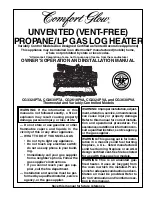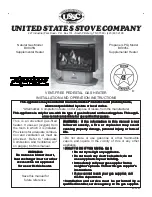
11
WATER PIPING
WATER (POTABLE) HEATING AND SPACE HEATING
This water heater shall not be connected to any heating systems
or component(s) used with a non-potable water heating appliance.
All piping components connected to this unit for space heating
applications shall be suitable for use with potable water.
Toxic chemicals, such as those used for boiler treatment shall not
be introduced into this system.
When the system requires water for space heating at temperatures
higher than required for domestic water purposes, a mixing valve
must be installed. Please refer to Figure 6 for suggested piping
arrangement.
These water heaters cannot be used in space heating applications
only.
CLOSED WATER SYSTEMS
Water supply systems may, because of code requirements or
such conditions as high line pressure, among others, have
installed devices such as pressure reducing valves, check
valves, and back flow preventers. Devices such as these cause
the water system to be a closed system.
THERMAL EXPANSION
As water is heated, it expands (thermal expansion). In a closed
system the volume of water will grow when it is heated. As the
volume of water grows there will be a corresponding increase in
water pressure due to thermal expansion. Thermal expansion
can cause premature tank failure (leakage). This type of failure
is not covered under the limited warranty. Thermal expansion
can also cause intermittent Temperature-Pressure Relief Valve
operation: water discharged from the valve due to excessive
pressure build up. This condition is not covered under the limited
warranty. The Temperature-Pressure Relief Valve is not intended
for the constant relief of thermal expansion.
A properly sized thermal expansion tank must be installed on
all closed systems to control the harmful effects of thermal
expansion. Contact a local plumbing service technician to have
a thermal expansion tank installed.
FIGURE 7.
NOTE: To protect against untimely corrosion of hot and cold
water fittings, it is strongly recommended that di-electric unions
or couplings be installed on this water heater when connected to
copper pipe.
Figure 7 shows the typical attachment of the water piping to the
water heater.
TEMPERATURE-PRESSURE RELIEF VALVE
Explosion Hazard
Temperature-Pressure Relief Valve
must comply with ANSI Z21.22-
CSA 4.4 and ASME code.
Properly sized temperature-
pressure relief valve must be
installed in opening provided.
Can result in overheating and
excessive tank pressure.
Can cause serious injury or death.
This water heater is provided with a properly rated/sized and
certified combination Temperature-Pressure Relief Valve (T&P
valve) by the manufacturer. The valve is certified by a nationally
recognized testing laboratory that maintains periodic inspection
of production of listed equipment of materials as meeting the
requirements for Relief Valves for Hot Water Supply Systems,
ANSI Z21.22 • CSA 4.4, and the code requirements of ASME.
If replaced, the new T&P valve must meet the requirements
of local codes, but not less than a combination Temperature-
Pressure Relief Valve rated/sized and certified as indicated in
the above paragraph. The new valve must be marked with a
maximum set pressure not to exceed the marked hydrostatic
working pressure of the water heater (150 psi = 1,035 kPa)
and a discharge capacity not less than the water heater Btu/
hr or kW input rate as shown on the water heater’s model
rating label.












































